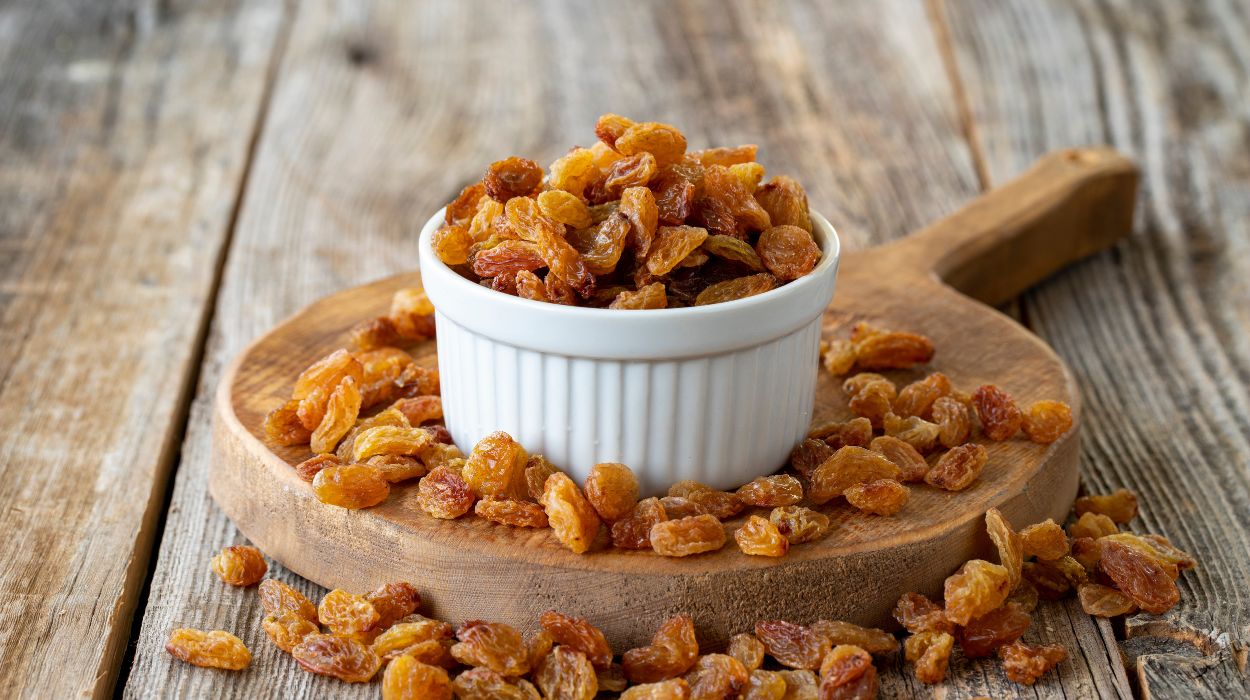 Expert's opinion
Expert's opinion
Expert's opinion
The article is a subjective view on this topic written by writers specializing in medical writing.
It may reflect on a personal journey surrounding struggles with an illness or medical condition, involve product comparisons, diet considerations, or other health-related opinions.
Although the view is entirely that of the writer, it is based on academic experiences and scientific research they have conducted; it is fact-checked by a team of degreed medical experts, and validated by sources attached to the article.
The numbers in parenthesis (1,2,3) will take you to clickable links to related scientific papers.
Raisins Benefits: Are Raisins Good For You 2024?

Raisins are golden or purple grapes that have been sun-dried or dehydrated. But are raisins good for you, or are they just a dose of concentrated sugar? Read on to learn more about the science behind the benefits of eating grapes and how to include them in your diet.
Health Benefits Of Raisins
Raisins are high in vitamins, minerals, and antioxidants, which provide numerous health benefits, including:
- Appetite regulation
- Improved immunity.
- Cardiovascular health support
- Enhancing bone health
- May Improve Dental Health
- Enhancing digestive health
- Improving sleep quality
- Diabetic symptom reduction
- Delaying or inhibiting cancer expression
Benefits Of Raisins
The health benefits of eating raisins include:
Controls Appetite

Small studies suggest that eating raisins can reduce appetite[1] in healthy people. Compared to a dose of the same amount of sugar as glucose, this study found that those who ate raisins had significantly reduced ghrelin levels two to three hours later. Ghrelin is our main hunger hormone.
Why do raisins have this effect on appetite? Raisins have a low-to-medium glycemic index, meaning they raise blood sugar slowly and steadily. This is probably due to their fiber content. Raisins contain approximately 4.5 grams[2] of dietary fiber. Fiber creates bulk and moves slowly through our digestive tract, keeping us satisfied for longer.
So, eating raisins can be a great between-meal snack that might help you eat less at your next meal.
Enhances Immunity
Raisins have powerful antioxidant properties that have been linked to their phenolic content. They have a high nutrient profile that includes vitamins and minerals as well as compounds like polyphenols and antioxidants.
After being dried, raisins keep most of the antioxidant compounds[3] present in grapes, even the potent antioxidant resveratrol. Actually, raisins are a more concentrated source of antioxidant compounds compared to grapes.
So it’s unsurprising that raisins have antibacterial, antifungal, and antiviral properties that protect against infections. Raisins’ polyphenols and antioxidants,[4] such as vitamin C and other essential nutrients also have anti-inflammatory and pain-relieving properties against inflammatory conditions.
Protects Cardiovascular Health
Raisins’ high phenolic and fiber content has also been linked to better cardiovascular health.
Studies show that raisins can increase antioxidant capacity,[5] lower systolic blood pressure, inhibit inflammatory responses, and lower low-density lipoprotein, otherwise known as bad cholesterol. All of these are linked to a lower risk of cardiovascular disease.
Although raisins might reduce cardiovascular risk factors, researchers warn that such effects may not be seen in people who are overweight.
Improves Bone Health
Eating raisins can strengthen bones and might help prevent osteoporosis, an age-related bone loss disorder. Nutrients in raisins, including vitamin C and vitamin D and the minerals calcium and boron, help to maintain bone and joint health.[4]
May Improve Dental Health

Raisins might also improve dental and oral health.[4] Why? Because of raisins’ antibacterial properties and the type of sugar they contain. Raisins contain very little sucrose, the main sugar that plaque-forming oral bacteria consume. They also contain phytochemicals that may help fight cavity-causing bacteria.
So, raisins are a healthier alternative to sucrose-containing treats, allowing you to enjoy their sweetness without jeopardizing your dental health.
Improves Digestive Health
Studies show that raisins can change the balance of our gut bacteria[6] by increasing beneficial bacteria[7] and reducing levels of opportunistic pathogenic bacteria.
Raisins contain prebiotics,[4] which help balance the gut microbiota. Prebiotics, such as dietary fiber, are not digested or absorbed by humans, so act as food for the good bacteria in our gut, allowing them to flourish.
Raisins might reduce levels of bad gut bacteria due to their antibacterial polyphenols.[8]
Raisins’ insoluble fibers also act as natural laxatives, increasing stool bulk and helping prevent constipation. Raisins might also help prevent other gastrointestinal issues like flatulence, bloating, gas, irritable bowel syndrome, and abdominal pain.
Enhances Sleep Quality
Good sleep is crucial for overall health and well-being, supporting mental to physical health. Can eating raisins really help you sleep better?
Raisins provide iron and magnesium, minerals that aid sleep in different ways. Iron is required for hemoglobin production, oxygen transportation, stimulating metabolism, and improving sleep quality.[9]
Magnesium intake is linked to sleep quality and duration.[10] Magnesium is important for helping the body produce melatonin, known as the sleep hormone. According to experts, melatonin does not directly affect sleep; rather, raising its levels in the evening puts you in a quiet wakeful state that welcomes sleep.
Grapes and raisins also contain melatonin.[11] However, there’s little evidence that food sources of melatonin actually impact your body’s melatonin levels.
Inhibits Diabetic Symptoms
Consuming raisins may reduce your risk of developing type 2 diabetes.[4] Raisins have a low-to-moderate glycemic index,[3] meaning they steadily raise blood sugar. This makes them suitable for people with diabetes or insulin resistance as they help keep blood sugars in check.
May Delay Cancer
Animal studies reveal that raisins might help with other health conditions such as cancer and Alzheimer’s disease.[12] Studies in humans show that regularly consuming grape products slows the rate of cognitive decline.[13] This is probably due to the resveratrol content. However, more research is needed to back up such claims.
Resveratrol is also the main reason behind grape and raisins’ anti-cancer properties.[14] So far, research suggests that consuming a diet rich in polyphenols such as resveratrol can help delay cancer development.[15]
Are Raisins Good For You?
Yes, raisins have many health benefits and minimal downsides. They can relieve constipation, provide iron to increase red blood cells, help prevent anemia, protect bone and dental health, and may even reduce cancer risk.
Raisins can provide calcium, iron, magnesium, potassium, phosphorus, zinc, fiber, fatty acids, niacin, folate, and vitamins B6, E, and K. Though they’re also high in sugar, it’s added sugars that are worst for your health — not natural dried fruit sugars.
So, despite their high sugar content, raisins do more good than harm — as long as you don’t eat too many dried fruits.
Side Effects & Safety
Raisins have some drawbacks related to their high sugar content. By weight, raisins are 65% sugar. Experts advise keeping track of how many raisins you eat each day to avoid consuming too much sugar, especially for those with diabetes.
Stick to one serving of one to two ounces of raisins daily. According to the USDA, one ounce of seedless grapes provides 85 calories and almost 19 grams of sugar.
Health Raisins Recipes You Should Try
Ready to incorporate more raisins into your diet? It can be challenging to change your eating habits, so we’ve made it easier by sharing some of the best healthy raisin recipes.
Oat Meal Raisin Cookies
Ingredients
- 1½ cups all-purpose flour
- 1 large egg
- 1½ cups sun-dried raisins
- 1 teaspoon cinnamon
- 3 cups quick oats
- 1 cup softened butter
- 1 teaspoon pure vanilla extract
- ¾ cup brown sugar
- ½ cup granulated sugar
- 1 teaspoon kosher salt
- ¼ teaspoon nutmeg
- 1 teaspoon baking soda
Directions
Step 1
- Preheat the oven to 350 degrees F.
- Line two baking sheets with parchment paper.
- Mix the butter and sugar in a large mixing bowl until the mixture is light and fluffy.
- Stir in the eggs, then the vanilla extract.
Step 2
- Whisk the flour, salt, nutmeg, cinnamon, and baking soda in a separate large mixing bowl.
- Combine the current and previous mixtures and stir thoroughly.
- Stir in the oats and raisins.
- If the dough is too dry, add one tablespoon of plant milk at a time, stirring after each addition, until it holds together.
Step 3
- Onto the baking sheets, spoon the dough, and bake until done.
- The baking process should take 12 minutes.
Moroccan Carrot Salad
Ingredients
- 1 pound carrots, peeled and grated
- ¾ cup golden raisins
- ¾ cup peanuts
- 2 green onions, thinly sliced
- ¼ cup freshly chopped cilantro
- ¼ cup extra-virgin olive oil
- Juice and zest 1 lime
- 1 teaspoon honey
- 2 teaspoon harissa
- 2 cloves garlic, minced
- Freshly ground black pepper
- 2 teaspoons freshly grated ginger
- 1 teaspoon ground cumin
- Kosher salt
Directions
Step 1
- Combine the raisins, carrots, peanuts, green onions, and cilantro in a big bowl.
Step 2
- Whisk the lime juice and zest, ginger, garlic, cumin, honey, harissa, and oil in a medium-sized mixing bowl.
- Toss the carrots in the mixture to coat.
- Season with salt and pepper to taste.
Raisin Chutney Recipes
Ingredients
- 1 cup raisins
- ½ teaspoon ginger grated
- ½ teaspoon cumin powder
- ½ teaspoon chili powder
- 1 teaspoon lime juice
- Salt to taste
Directions
- Soak raisins for 1 hour in lukewarm water.
- Blend with the remaining ingredients to make a fine paste. The raisin chutney is ready.
- Refrigerate the mixture for up to two weeks.
Conclusion
So, are raisins good for you? Yes, raisins, which basically dried grapes have lots of health benefits, including improving nutritional intake, increasing satiety, and even improving brain and dental health.
They provide essential minerals, vitamins, fatty acids, antioxidants, and phytochemicals, especially health-promoting resveratrol. Raisins are a natural sweetener that is far safer for your teeth than candy and other sucrose-containing treats.
However, watch out to not overconsume raisins to avoid eating too much sugar. Aim for one ounce, or around 30 grams, daily.
+ 15 sources
Health Canal avoids using tertiary references. We have strict sourcing guidelines and rely on peer-reviewed studies, academic researches from medical associations and institutions. To ensure the accuracy of articles in Health Canal, you can read more about the editorial process here
- Kaliora, A.C., Kanellos, P., Aristea Gioxari and Karathanos, V.Τ. (2017). Regulation of GIP and Ghrelin in Healthy Subjects Fed on Sun-Dried Raisins: A Pilot Study with a Crossover Trial Design. Journal of Medicinal Food, [online] 20(3), pp.301–308. doi:https://doi.org/10.1089/jmf.2016.0123.
- Usda.gov. (2023). FoodData Central. [online] Available at: https://fdc.nal.usda.gov/fdc-app.html#/food-details/1102640/nutrients
- Hernández‐Alonso, P., Lucía Camacho-Barcia, Mònica Bulló and Jordi Salas‐Salvadó (2017). Nuts and Dried Fruits: An Update of Their Beneficial Effects on Type 2 Diabetes. Nutrients, [online] 9(7), pp.673–673. doi:https://doi.org/10.3390/nu9070673.
- Olmo‐Cunillera, A., Escobar‐Avello, D., Pérez, A.J., María Marhuenda-Muñoz, Lamuela-Raventós, R.M. and Vallverdú‐Queralt, A. (2019). Is Eating Raisins Healthy? Nutrients, [online] 12(1), pp.54–54. doi:https://doi.org/10.3390/nu12010054.
- Schuster, M.J., Wang, X., Hawkins, T. and Painter, J.E. (2017). A Comprehensive review of Raisins and Raisin components and their relationship to human health. [online] ResearchGate. Available at: https://www.researchgate.net/publication/319062831_A_Comprehensive_review_of_Raisins_and_Raisin_components_and_their_relationship_to_human_health
- Zoi Katsirma, Eirini Dimidi, Rodriguez‐Mateos, A. and Whelan, K. (2021). Fruits and their impact on the gut microbiota, gut motility and constipation. Food & Function, [online] 12(19), pp.8850–8866. doi:https://doi.org/10.1039/d1fo01125a.
- Akemi Wijayabahu, Waugh, S., Ukhanova, M. and Mai, V. (2019). Dietary raisin intake has limited effect on gut microbiota composition in adult volunteers. Nutrition Journal, [online] 18(1). doi:https://doi.org/10.1186/s12937-019-0439-1.
- Yadav, D., Kumar, A., Kumar, P. and Mishra, D. (2015). Antimicrobial properties of black grape (Vitis vinifera L.) peel extracts against antibiotic-resistant pathogenic bacteria and toxin producing molds. Indian Journal of Pharmacology, [online] 47(6), pp.663–663. doi:https://doi.org/10.4103/0253-7613.169591.
- Leung, W., Singh, I., McWilliams, S., Stöckler, S. and O. Ipsiroglu (2020). Iron deficiency and sleep – A scoping review. Sleep Medicine Reviews, [online] 51, pp.101274–101274. doi:https://doi.org/10.1016/j.smrv.2020.101274.
- Zhang, Y., Chen, C., Lu, L., Knutson, K.L., Carnethon, M.R., Fly, A.D., Luo, J., Haas, D.M., Shikany, J.M. and Kahe, K. (2021). Association of magnesium intake with sleep duration and sleep quality: findings from the CARDIA study. SLEEP, [online] 45(4). doi:https://doi.org/10.1093/sleep/zsab276.
- Marcello Iriti and Elena Maria Varoni (2015). Melatonin in Mediterranean diet, a new perspective. Journal of the Science of Food and Agriculture, [online] 95(12), pp.2355–2359. doi:https://doi.org/10.1002/jsfa.7051.
- Schuster, M.J., Wang, X., Hawkins, T. and Painter, J.E. (2017). A Comprehensive review of Raisins and Raisin components and their relationship to human health. [online] ResearchGate. Available at: https://www.researchgate.net/publication/319062831_A_Comprehensive_review_of_Raisins_and_Raisin_components_and_their_relationship_to_human_health
- Restani, P., Fradera, U., Ruf, J.-C., Stockley, C.S., Pierre-Louis Teissèdre, S. Biella, Colombo, F. and Chiara Di Lorenzo (2020). Grapes and their derivatives in modulation of cognitive decline: a critical review of epidemiological and randomized-controlled trials in humans. Critical Reviews in Food Science and Nutrition, [online] 61(4), pp.566–576. doi:https://doi.org/10.1080/10408398.2020.1740644.
- Rauf (2018). Resveratrol as an anti-cancer agent: A review. Critical reviews in food science and nutrition, [online] 58(9). doi:https://doi.org/10.1080/10408398.2016.1263597.
- Farinetti, A., Zurlo, V., Manenti, A., Coppi, F. and Anna Vittoria Mattioli (2017). Mediterranean diet and colorectal cancer: A systematic review. Nutrition, [online] 43-44, pp.83–88. doi:https://doi.org/10.1016/j.nut.2017.06.008.



